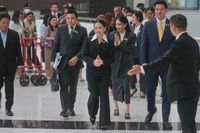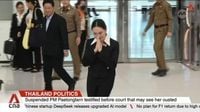In a week that could reshape Thailand’s political future, suspended Prime Minister Paetongtarn Shinawatra appeared before the Constitutional Court on August 21, 2025, to defend herself against allegations of ethical misconduct. The case, centered on a controversial phone call with Cambodia’s former leader Hun Sen, has gripped the nation and placed the powerful Shinawatra family’s political legacy under unprecedented scrutiny.
Paetongtarn, who turned 39 on the very day she took the stand, faced hours of in-camera testimony and cross-examination in Bangkok. According to AP, the hearing was conducted behind closed doors, with the court barring witnesses from discussing details on national security grounds. The secrecy only added to the drama surrounding a case that has already sparked intense debate across Thailand.
The allegations stem from a June 15, 2025, phone call between Paetongtarn and Hun Sen, then president of Cambodia’s Senate and a longtime friend of the Shinawatra family. The call, which was leaked to the public by Hun Sen himself in late June, revealed Paetongtarn referring to Hun Sen as “uncle” and criticizing a Thai army general for escalating a tense border standoff. Critics argue that her remarks amounted to siding with Cambodia and undermining the Thai armed forces during a period of national crisis.
The border dispute was far from a mere diplomatic spat. In late July, the situation erupted into five days of armed clashes that left dozens dead and forced more than 260,000 people from their homes, according to AP. A ceasefire was eventually reached, but the damage—both literal and political—had been done. The leaked call caused an uproar in Thailand, with a group of senators filing a petition to the Constitutional Court accusing Paetongtarn of breaching ethics and integrity clauses in the Constitution.
Paetongtarn responded to the controversy by apologizing to the public. She insisted, as reported by AP, that her comments were merely a negotiating tactic and denied causing any harm to Thailand’s interests. "I didn’t do any damage to Thailand," she argued, seeking to reassure a skeptical nation. But the court was not immediately convinced. On July 1, 2025, it voted 7-2 to suspend her from her prime ministerial duties while it reviewed the petition—a unanimous decision to take up the case, reflecting the seriousness with which the allegations are being treated.
The Constitutional Court is scheduled to deliver its verdict on August 29, 2025. Both Paetongtarn and her accusers have been instructed to submit their closing statements by August 25. If found guilty, Paetongtarn would become the third member of the Shinawatra family to be forced from office—a striking pattern in Thai politics that underscores the family’s controversial legacy.
The Shinawatras, led by the family patriarch Thaksin, have dominated Thai politics for three decades, alternating between landslide election victories and dramatic downfalls. Thaksin himself was ousted in a 2006 military coup and later convicted of conflict of interest and abuse of power. He avoided imprisonment by fleeing abroad but returned to Thailand in 2023, serving only a brief sentence in a hospital suite before being paroled and pardoned. Paetongtarn’s aunt, Yingluck Shinawatra, was also removed from office by the Constitutional Court in 2014, just weeks before another military takeover.
The timing of Paetongtarn’s testimony is especially significant. It came just one day before her father, Thaksin, was due to face his own legal reckoning. On August 22, 2025, Bangkok’s Criminal Court is expected to rule on whether Thaksin committed royal defamation—a charge that carries a prison sentence of three to 15 years. The case relates to remarks he made in a 2015 interview about the coup that toppled Yingluck’s government. Thaksin also faces prosecution under Thailand’s cybercrime law, compounding his legal troubles.
For many Thais, these twin court cases feel like a crossroads moment. As CNA reported, political observers see them as potentially marking “the beginning of the end for the Shinawatras’ hold on power.” The family’s enduring influence has long been a source of both admiration and resentment, dividing the country into fierce camps. Supporters view the Shinawatras as champions of democracy and populist policies that have benefited ordinary Thais. Detractors accuse them of corruption, cronyism, and undermining key national institutions.
The current case against Paetongtarn is particularly fraught because it touches on issues of national security and the military’s role in politics—two of Thailand’s most sensitive topics. Senators who filed the petition argue that Paetongtarn’s conduct during the phone call with Hun Sen not only betrayed ethical standards but also put Thailand’s sovereignty at risk. They point to her family’s close relationship with the Cambodian leader, which until the recent dispute had been a political asset but now looks like a liability.
Paetongtarn’s immediate predecessor, Srettha Thavisin, was also dismissed by the Constitutional Court in 2023 for an ethics violation, highlighting the growing power of the judiciary in shaping Thailand’s political landscape. Critics of the court say it has become a tool for removing elected leaders who challenge the status quo, while defenders argue that it is upholding the rule of law in a turbulent era.
The broader context is a country still struggling to balance democratic aspirations with entrenched military and royalist interests. The Shinawatra family’s repeated clashes with the establishment have fueled cycles of protest, coup, and court-ordered change. Each episode leaves the political system more brittle and the public more divided.
As the August 29 verdict approaches, all eyes are on the Constitutional Court. The outcome will not only determine Paetongtarn’s fate but also send a powerful signal about the future direction of Thai politics. Will the Shinawatras survive yet another challenge, or is this truly the end of an era?
Whatever the court decides, one thing is certain: Thailand’s political drama is far from over, and the reverberations of this week’s events will be felt for years to come.


